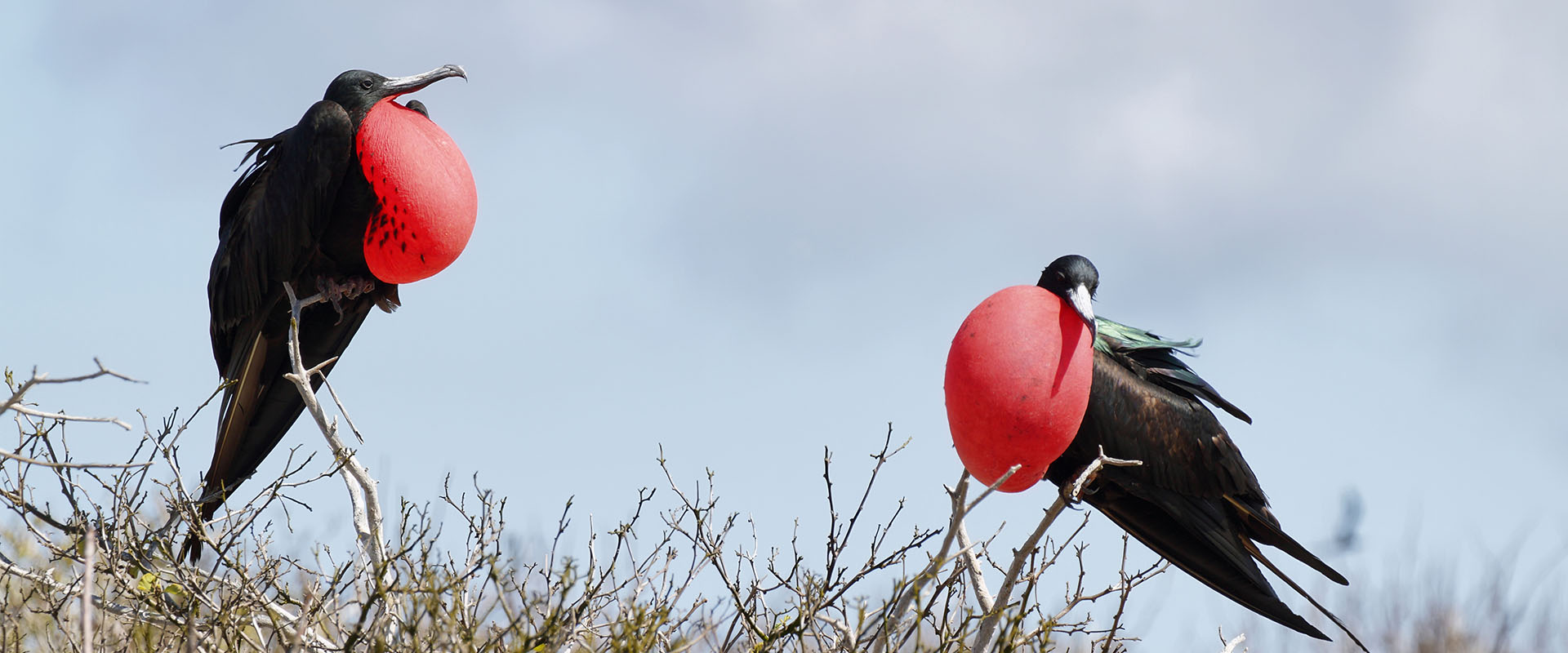Adventure Cruises in Genovesa Island
Genovesa Island cruises will introduce visitors to one of the archipelago’s most interesting islands, and a highlight on any Galapagos Islands adventure cruise. Located to the north and formed by the long-ago eruption of a shield volcano, Genovesa Island’s most distinct geological features are its otherworldly lava fields, the collapsed caldera that forms Darwin Bay, and Lake Arcturus, a salt-water crater lake.
Genovesa Island’s English name is Tower Island, but it is more popularly known as Bird Island, for reasons that will be readily apparent!
Top things to do & see at Genovesa Island
Despite being one of the smaller Galapagos Islands and slightly removed from its sister islands, Genovesa Island highlights Galapagos cruise itineraries. Untouched and unpopulated, Genovesa Island has been given over to a wide variety of bird life and marine life, making it a bird watcher’s paradise. At the same time, those seeking adventure activities will love hiking Genovesa Island’s trails and snorkeling its submerged caldera.
Darwin Bay Beach is reached via dinghy and a dry landing. Visitors are greeted by red-billed tropic birds and great frigatebirds whirling overhead, making it immediately apparent why Genovesa Island was nicknamed Bird Island.
A hike along a rocky path takes visitors to a tidal lagoon, home to lava herons, lava gulls, and swallow-tailed gulls, the only nocturnal gulls in the world. The path continues to the top of a hill overlooking the bay. A birdwatcher’s delight, this area is the site of one of the world’s largest red-footed booby-nesting colonies. The smallest of the three species of booby birds encountered on Galapagos Island cruises, it is estimated that there are over 200,000 red-footed boobies living on Genovesa Island.
Visitors seeking adventure activities and Genovesa Island wildlife encounters of the underwater variety will want to strap on their snorkels or scuba tanks. Darwin Bay Beach is an excellent spot to explore the submerged walls of Genovesa Island’s collapsed caldera. Marine wildlife encounters include hammerhead sharks, sea turtles, and manta rays.
El Barranco, also known as Prince Philip’s Steps, includes a steep hike to the top of an 82-foot cliff and through various bird colonies, offering visitors yet another series of spectacular Genovesa Island wildlife encounters.
From the top of the cliff, peering out over the lava fields to see wedge-rumped storm petrels darting to and fro. These petrels are unique to Genovesa Island because they are active during the day, unlike their nocturnal cousins. Watch for the elusive short-eared owls, which occasionally cruise the lava fields, hunting for petrels.
The trail continues along the plateau, through a palo santo forest to nesting red-footed booby colonies. The small birds perch among the low trees and within the bushes.
Top Tips for Genovesa Island
- Bring a camera and be prepared to use a high shutter speed to capture frigatebirds and petrels in motion.
- Paths on Genovesa Island are rocky, so bring a good pair of hiking shoes.
- Pack your bathing suit, towel, and snorkeling gear to explore the underwater walls of Genovesa Island’s caldera.
- Watch your step when hiking through Genovesa Island so as not to crush any swallow-tailed gull eggs inadvertently.
Best time to cruise Genovesa Island
Though certain Genovesa Island wildlife encounters can be enjoyed throughout the year, visitors on Genovesa Island cruises will want to plan. Red-footed boobies and masked boobies nest year-round on Genovesa Island, but some times of the year are better for seeing other wildlife and enjoying adventure activities.
For example, Genovesa Island offers the best underwater visibility and highest water temperatures in January to March, making it the ideal time to snorkel and scuba dive.
Genovesa Island from March to May is frigatebird mating season, the best time to see the huge birds’ thrilling mating rituals.
Genovesa Island, from July to November, has more nutrient-rich waters and, in turn, more active and abundant marine life, making it the perfect time to see wildlife while snorkeling or scuba diving.
Where do Genovesa Island cruises depart from?
Typically, small ship cruises to Genovesa Island leave from Baltra, Puerto Ayora, or San Cristobal Island.
Flights from Quito or Guayaquil, Ecuador, take visitors from the mainland to the airport of Baltra, an hour from Puerto Ayora, or the airport on San Cristobal Island, near Puerto Baquerizo Moreno. The airport on Isla Baltra services Genovesa Island cruises leaving from Baltra or Puerto Ayora. In contrast, those Galapagos cruises departing from San Cristobal Island will fly into San Cristobal airport.
Book your next adventure cruise to Genovesa Island, Galapagos.
Genovesa Island Adventure cruise reviews
- 9.3 Superb
- 8.4 Very good
- Chelsea P
United States
Amazing to see all the birds; almost felt prehistoric
Cruising Genovesa Island in May on the Archipel I
- 10.0 Exceptional
- Don A
United States
Awesome hiking to see many birds
Cruising Genovesa Island in February on the Infinity
- 8.4 Very good
- Adrienne C
United States
Excellent- lots of nesting birds and a huge variety
Cruising Genovesa Island in December on the Archipel I
- 10.0 Exceptional
- Mark B
United States
Birdlife was plentiful and the hike after Prince Phillips Steps was wonderful. Also the only place we saw the Galapagos "fur" sea lion.
Cruising Genovesa Island in September on the Reina Silvia Voyager
- 9.6 Exceptional
- Lucas T
United States
Good but not good weather and seas
Cruising Genovesa Island in July on the Natural Paradise
- 10.0 Exceptional
- Steven P
United States
Fabulous island. Bird life was amazing.
Cruising Genovesa Island in April on the Endemic
- 8.0 Very good
- Hassan A
United States
Although it was difficult for some people to climb the steps, Review was well worth it. We get to see the red footed boobies
Cruising Genovesa Island in January on the Natural Paradise
- 8.8 Fabulous
- Michael S
United States
Very good - lots of seabirds and other wildlife on this island. Our favorite island of the ones we visited on this trip
Cruising Genovesa Island in October on the Nemo III
- 10.0 Exceptional
- Kirsten P
United States
AMAZING. It's hard to pick a favorite island, but Genovesa was a highlight. Both the morning and afternoon excursions on land, and the snorkel mid-day, provided us the opportunity to see all the wildlife and appreciate Genovesa's unique landscape.
Cruising Genovesa Island in July on the Solaris
- 9.2 Superb
- Montana S
United States
My favorite island, I think. The amount and variety of birds were incredible. Every single moment was just so impressive, and the scenery was breathtaking.
Cruising Genovesa Island in March on the Eden











